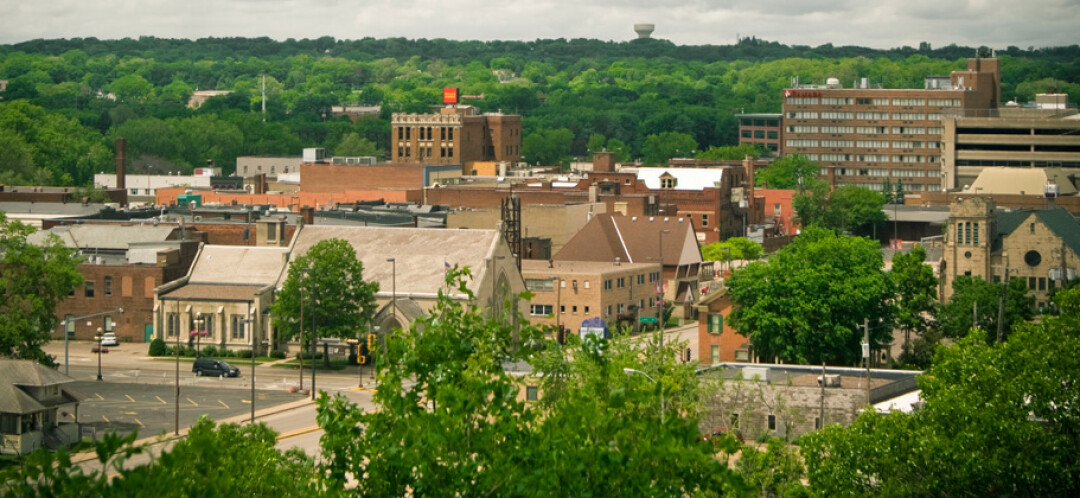Clearing up the Poverty Picture
Clear Vision plans community summit on poverty-related problems

On the international stage, summits are held to address the most troublesome problems: war, climate change, nuclear proliferation, and the like.
On the local level, summits can be used in the same way. Next month, Clear Vision Eau Claire – a nonprofit community planning organization – will convene a summit to tackle one of the most deep-rooted and vexing problems we face in the Chippewa Valley: poverty.
According to Clear Vision, the Poverty Summit is “a citizen-led, multi-year, and multi-generational public engagement and problem solving project to identify and take action on critical community issues related to poverty and income inequality in Eau Claire County.”
“Poverty is the classic wicked problem. There’s no agreed-upon definition, and no agreed-upon solution.” – Mike Huggins, Clear Vision Eau Claire
Poverty is a problem in nearly every American community, and Eau Claire is no exception. In fact, by certain measures, the poverty rate here meets or exceeds the rates in the state and nation. According to census data, more than 15 percent of Eau Claire County residents live under the federal poverty line, while more than 40 percent of students in the Eau Claire school district qualify for free and reduced-price lunches.
“Poverty is the classic wicked problem,” said Mike Huggins, former Eau Claire city manager and a Clear Vision board member who is co-chairing the Poverty Summit. “There’s no agreed-upon definition, and no agreed-upon solution.”
While numerous agencies and entities deal with aspects of poverty, Huggins noted there hasn’t been a previous community effort to bring together all of the stakeholders, including Western Dairyland, Positive Avenues, Lutheran Social Services, Sojourner House, Feed My People Food Bank, and the Community Table, as well as government entities. Likewise, these groups haven’t engaged together in a conversation with impacted people: those who actually live in poverty. Efforts are being made to draw into the process residents who rely on food pantries, those whose children attend high-poverty schools, homeless families, and others for whom poverty is a reality, not an abstraction. Including such people in the process presents challenges, Huggins explained: For example, a marginalized person who attends may have to forego a meal at the Community Table or a night at the Sojourner House, where the line forms hours before the doors open.
“We’re looking at what are the community aspects of poverty,” Huggins said. “This is not a ‘fix the poor people’ type of thing.”
Sheng Xiong, another Clear Vision board member who is co-chairing the summit, said the community conversation will involved seven evening sessions between October and March. The kickoff session will be 6pm Thursday, Oct. 6, at Grace Lutheran Church, 202 W. Grand Ave., Eau Claire. The gathering, which is open to all members of the public, will include a project overview and a snapshot of poverty in the area.
The first few summit meetings will include an overview of poverty-related data; after that, the focus will turn to gaps in services and setting priorities. At the end of the process, six action teams will be formed, which Clear Vision will assist in tackling various elements of the problem. These teams will continue their work for at least 18 months.
The summit is funded through a $10,000 grant from the Ash Center for Democratic Governance and Innovation at Harvard’s Kennedy School of Government (last year, Clear Vision was a finalist for the center’s Innovations in Public Engagement in Government Award), as well as funds the City of Eau Claire, Eau Claire County, and the City-County Health Department. Additional community funding is still being sought.
Measuring the success of the project will depend on which priorities are identified, Huggins said. However, broadly speaking, the initiative is aimed at reducing the impact of poverty and income inequality in Eau Claire County.
But first, the conversation has to begin. “As a whole, we just want to hear what people have to say,” Huggins said.
To learn more about Clear Vision and the Poverty Summit, visit clearvisioneauclaire.org.




















